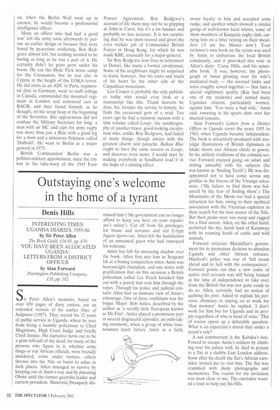Outstaying one's welcome in the home of a tyrant
Denis Hills
INTERESTING TIMES: UGANDA DIARIES, 1955-86 by Sir Peter Allen The Book Guild, £16.95, pp. 670 'YOU HAVE BEEN ALLOCATED UGANDA': LETTERS FROM A DISTRICT OFFICER by Alan Forward Poyntington Publishing Company, £18, pp. 182 Sir Peter Allen's memoirs, based on over 650 pages of diary entries, are an extended version of his earlier Days of Judgment (1987). They record his 32 years of public service in Uganda, where he rose from being a humble policeman to Chief Magistrate, High Court Judge and briefly Chief Justice. His narrative turns out to be a grim roll-call of the dead, for many of the persons who figure in it, whether army thugs or top African officials, were brutally murdered, some under torture, others thrown into the Nile or burnt to ashes in dark places. Allen managed to survive by keeping out of Amin's way and by placating Obote until the former guerrilla leader and current president, Museveni. brusquely dis
missed him ('My government can no longer afford to keep you here on your expatriate's salary'). Cut off from his privileges, his house and servants and red E-type Jaguar sports car, Allen felt the humiliation of an unwanted guest who had outstayed his welcome.
Amin has left his menacing shadow over the book. Allen first met him as Sergeant Idi at a boxing competition when Amin was heavyweight champion, and one notes with gratification that on this occasion a British policeman called Les Peach knocked him out with a punch that sent him through the ropes. Through his police and judicial contacts Allen had an intimate view of Amin's entourage. One of these confidants was the bogus 'Major' Bob Astles, described by the author as 'a scruffy little European known as Mr Fixit'. Astles played a prominent part in several disgraceful episodes: an oath-taking ceremony, when a group of white businessmen knelt before Amin in a field,
swore loyalty to him and accepted army ranks; and another which showed a similar group of well-known local whites, some of them members of Kampala rugby club, carrying him on a litter resting on their shoulders CI am the Master now'). Your reviewer's own book on the tyrant was used by Amin to embarrass the local British community, and it provoked this note in Allen's diary: 'Curse Hills, and his miserable book.' It was, however, the photograph of Amin gloating over his wife's mutilated body — the severed limbs and torso roughly sewed together — that had a special nightmare quality (Kay had been one of my students) and turned many Ugandan citizens, particularly women, against him. 'You were a bad wife,' Amin said, towering in his sports shirt over her sheeted remains.
Alan Forward's Letters from a District Officer in Uganda cover the years 1955 to 1963, when Uganda became independent. The book is attractively produced with nostalgic illustrations of British diplomats in khaki shorts and African chiefs in gowns. In the athletic traditions of the colonial service Forward enjoyed going on safari and mixing amicably with his subjects (he was known as 'Smiling Teeth'). He was disappointed not to have come across any gorillas in the forests of the Virunga volcanoes. (`My failure to find them was balanced by the fear of finding them'.) The Mountains of the Moon too had a special attraction for him, owing to their mythical association with the Victorian explorers in their search for the true source of the Nile. But their peaks were too steep and rugged for a final ascent. Allen, on the other hand, preferred the dry, harsh land of Karamoja with its roaming herds of cattle and wild animals.
Forward criticises Macmillan's government for its premature decision to abandon Uganda and other African colonies. Macleod's policy was one of 'full steam ahead and to hell with the consequences'. Forward points out that a new cadre of native civil servants was still being trained at the time of independence to take over from the British but was not quite ready to do so. Allen, certainly, had no notion of quitting his post. Asked to explain his perverse obstinacy in staying on to work for 'that monster' Amin, he replied, 'I don't work for him but for Uganda and its people regardless of who is head of state.' This of course opens up a debatable question. What is an expatriate's moral duty under a tyrant's rule?
A sad commentary is the Kabaka's fate. Forced to escape Amin's soldiers by climbing over his palace wall, he died in penury in a flat at a shabby East London address. Soon after his death the flat's African caretaker invited me to visit him. The flat was crammed with dusty photographs and mementoes. The reason for my invitation was soon clear to me. The caretaker wanted a loan to help pay his bills.


























































 Previous page
Previous page